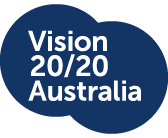MEDIA RELEASE
Global eye health was the flavour of the day at the Parliamentary Friends Group breakfast event at Parliament House in Canberra last week.
A distinguished line-up of speakers took to the stage to update parliamentarians on key eye health and vision care initiatives playing out across the world.
CEO of Vision 2020 Australia, Jennifer Gersbeck, said there had been a number of recent developments globally and the breakfast was a good opportunity to reflect on these changes.
Brian Doolan, CEO of The Fred Hollows Foundation outlined some of the work being done to end avoidable blindness including efforts to eliminate trachoma, embed disability, low vision and blindness into the post-2015 MDG discussions and the launch of the Queen Elizabeth Diamond Jubilee Trust in Australia which had chosen to focus its activity on blindness prevention.
Ms Gersbeck also used the breakfast to launch the Vision 2020 Australia draft Global Strategy – 2014 to 2019 to the eye health and vision care sector and parliamentarians. Initially, the strategy will focus on Asia and the Pacific.
Ms Gersbeck said Vision 2020 Australia members had worked collaboratively on the global strategy to guide programming, planning and advocacy work of agencies active in the region.
Aligned with the objectives of the soon to be endorsed World Health Organisation Plan ‘Universal access to eye health: a global action plan 2014 – 2019’, the draft strategy recognised that through cost-effective interventions, people’s lives could be changed.
“Our goal is to reduce avoidable blindness and vision impairment as a global health problem and secure access to rehabilitation services for people with vision impairment in Asia and the Pacific,” Ms Gersbeck said.
Ms Gersbeck said the new plan would lead Australia into a new era.
“Much has already been achieved, but as we count down to 2020, we must all continue to play a role in the elimination of avoidable blindness. We now have a new plan to realise this vision,” Ms Gersbeck said.
The Hon Richard Marles MP, Parliamentary Secretary for Pacific Island Affairs and Parliamentary Secretary for Foreign Affairs and the Hon Teresa Gambaro, Shadow Parliamentary Secretary for International Development Assistance also spoke at the event.
Mr Marles took the opportunity to remind attendees that the impact of blindness and vision impairment in the region was significant.
“We know the blind and disabled are often the poorest of the poor – they have less education, fewer economic opportunities and poorer health outcomes,” Mr Marles said.
“Our investment in prevention and treatment of vision impairment is an investment in poverty reduction,” he said.
“But international aid and the efforts of NGOs alone will never be enough. To be sustainable, domestic investment in all our partner countries is required.”
“Each country needs to know the extent and impact of visual impairment in their own context. If countries don’t have this basic information, it’s difficult to plan and prioritise limited resources to meet eye health and other health care needs.”
Ms Gambaro said an aspirational goal was required to tackle the huge number of people who were needlessly blind and vision impaired globally.
“And that’s exactly what Vision 2020 Australia is going after with their draft regional strategy 2014-2019 – a vision of: A world in which nobody is needlessly vision impaired, where those with unavoidable vision loss can achieve their full potential and where there is universal access to comprehensive eye care services.
“How that translates in our region is by setting a goal: To mobilise and support the efforts of governments, civil society and private sector organisations to ensure the development of comprehensive eye care services integrated in strong health systems throughout Asia and the Pacific,” she said.
Also among the speakers was Professor Ron McCallum, AO, Chair of the UN Committee on the Rights of Persons with Disabilities who paid tribute to the work being done by the sector to include disability into eye health services.
As part of his address, Professor McCallum introduced CBM Australia’s new program guide to disability in development, ‘Inclusion Made Easy’.
The guide is a brief, practical document on how to ensure development programs are disability-inclusive. Promoting rights of people with disabilities, it offers basic inclusion principles, practical tips, stand-alone sector-specific strategies and NGO case studies.
Professor McCallum called for two outcomes. The first was to ensure people with a disability had access to services and the second was for those who could not be cured to be able to live a full life.
Guests were entertained by PFG co-chairs, Member for Kingston Amanda Rishworth, and former ophthalmologist and Federal Member for Bowman, Andrew Laming, who continue to support Vision 2020 Australia’s advocacy efforts.
ENDS
Media Contact
Louise Rudzki, Vision 2020 Australia, (03) 9656 2020, +61 414 784 359
